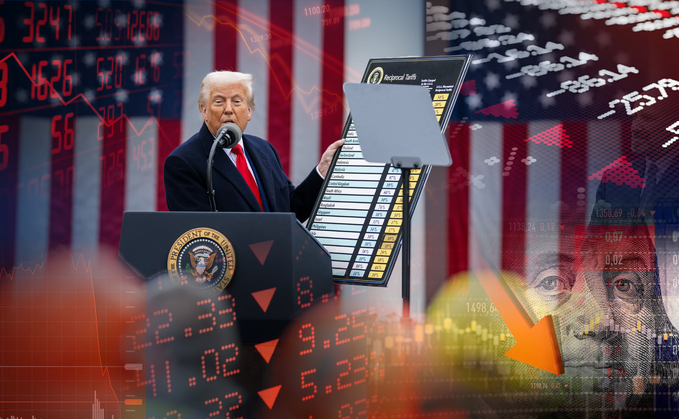
‘Liberation Day’ tariffs were announced by US president Donald Trump on 2 April
Jonathan Stapleton looks at how ‘Liberation Day’ tariffs announced by US president Donald Trump on 2 April and the ensuing turmoil in markets have impacted defined benefit (DB) pension schemes.
The announcement by Donald Trump of so-called "reciprocal tariffs" on 2 April – a universal 10% tariff on all imported goods followed by further tariffs on dozens of named countries –sent shockwaves through global financial markets, shockwaves that were only partially reversed after the president's 90-day pause on some of these levies on 9 April.
Much of the focus in US markets was on Treasuries, but the deepening sell-off of these assets dragged government borrowing costs around the world higher – including in the UK, where gilt yields rose sharply.
Since the beginning of April, the yield on 30-year gilts rose from 5.292% to its highest level since the 1990s amid the turmoil in global markets and a sell-off in US Treasuries – surpassing the previous January highs to reach 5.675% on Wednesday (9 April), before falling back to 5.552% at 2pm today (11 April).
Yields on shorter-dated paper were less affected but still saw significant volatility over the month – with yields on ten-year gilts rising from 4.689 at the beginning of the month to a high of 4.858% on Wednesday (9 April), just short of the 17-year high of 4.909% set in January. By 2pm today, yields had fallen back to 4.734%.
Equity markets were similarly affected by the turmoil in markets – with the S&P 500 falling by 5.9% from 5,597.53 to 5,268.05 over the month to close of business yesterday; the FTSE 100 falling by about 7.4% from 8,582.81 at the beginning of the month to around 7,950 by 2pm today; and the Nikkei 225 declining by about 6% from 35,751.02 to 33,585.58 during April so far.
Impact on schemes
Insight Investment head of solution design Jos Vermeulen said DB schemes had entered this period "in a position of strength" – adding the impact of this tariff storm had been "muted so far".
He said: "This should be no surprise due to the level of de-risking that has taken place in the DB world over the last two decades and improvements in governance practices since the gilts-crisis. We would therefore also not expect this position of strength to change any time soon for the typical scheme."
WTW chief investment officer for UK investment advisory Alasdair Macdonald added: "Following derisking over the last few years, DB schemes are no longer big investors in equities on the whole. While credit has sold off too, moves have been less dramatic than equities and most pension funds will have some ability to reflect changes in corporate spreads in their liability discount rate."
And Macdonald added that, while gilt yields had been volatile, they were currently only back to the levels than prevailed at the start of the year.
Schroders global co-head of client solutions Ajeet Manjrekar said it was still too early to say what the short- to medium-term impact of US tariffs may mean, beyond a "significant uptick in market volatility" alongside revisions to inflation expectation across the board.
Despite this, Manjrekar said the turmoil had had an impact on UK schemes. He said: "The global sell-off will have likely had an adverse impact on UK pension schemes' growth assets. Depending on their underlying exposures, this may have led to a potential reduction in scheme funding levels."
Russell Investments fiduciary manager Aqib Merchant said the sharp global sell-off in equities and bonds had already partially reversed – meaning one of the key risks over the past week was investor overreaction.
However, he agreed that some schemes – those, for instance, with valuation dates during the period – may have greater challenges.
Merchant said: "DB schemes with triennial valuation dates at the end of March or the first week of April (a common time) are likely to have crystallised weaker positions. This presents a strong case for pragmatism, with a focus on incorporating post-valuation experience into the overall assessment."
Collateral buffer
Schroders' Manjrekar the significant upwards move in gilt yields, with yield curves steepening as inflation expectations are being repriced with flows out of shorter-dated gilts into credit are having an effect on markets.
But he said these movements would likely have a limited impact on DB schemes.
He said: "Most DB schemes are very well collateralised today following the industry-wide de-leveraging carried out post the 2022 gilts crisis, and therefore should be able to withstand recent market movements."
WTW's Macdonald agreed – adding that, following the liability-driven investment (LDI) crisis in 2022, most pension funds hold 425 basis points or more of collateral headroom against a regulatory minimum of around 300 basis points, so these moves are not causing distress.
He explained: "Any mark-to-market losses would only have become realised losses if schemes were forced to sell; the increased use of cashflow-matching investment approaches means this is unlikely to have been the case."
Russell Investments' Merchant agreed the key concern for trustee boards was whether potential collateral calls could crystallise market losses. He said: "In this context, adopting a dynamic approach is essential - trustees must proactively assess how and where to source liquidity if LDI managers request additional collateral."
XPS Group chief investment officer Simeon Willis agreed – noting that DB schemes with high hedging levels and low risk strategies would have "sailed through the recent turbulence" unlike in 2022 where lower risk schemes in some cases suffered most.
He added: "This is nothing like the 2022 gilts crisis. Whilst yields have hit the highest levels in the last 25 years, LDI funds have been resilient with many not even needing to issue business as usual capital calls given the implicit resilience buffers."
However, Willis said this was not to say the gilt market would not come under increasing stress. He added: "Decision makers will need to carefully manage the rate of quantitative tightening and general gilt issuance in light of the wider bond market conditions."
Legal & General head of solutions for portfolio management Guy Whitby Smith agreed that, following the LDI crisis in 2022, the resilience of LDI portfolios to interest rate rises had increased markedly – meaning they were comfortably able to accommodate the market volatility seen over the last week.
Whitby Smith said some schemes may have benefitted from the rise in yields. He said: "In terms of gilt yields, pension schemes are on average around 80% hedged on interest rates, so the increase in interest rates over the last week will have benefited pension schemes to the extent they are still around 20% unhedged on interest rates, because higher interest rates reduce the value of long dated pension liabilities."
Van Lanschot Kempen (VLK) managing director of fiduciary management and institutional solutions Pat Race said that, while the increase in yields would impact DB plans in different ways but, some schemes may well be looking at their collateral pools and hoping they have enough.
He explained: "Segregated LDI portfolios – which are far better structured now following the lessons of the past 15 years – should be weathering the storm, though we would expect this to be the final whistle for pooled LDI funds.
"The maths of pooled funds as rates rise will be pushing values lower and potentially causing capital calls, they end up not needing. With other assets falling in value, it is going to be far more difficult to maintain the protection in the pooled environment than it will be for segregated investors."
A new world order?
But while DB schemes may be more resilient to shocks such as those experienced over the last week, Russell Investments' Merchant notes the tariff dispute is still "far from resolved".
He said: "The broader economic consequences will depend heavily on how future trade policies evolve. Importantly, tariffs are just one of several policy areas that warrant close attention. Developments in immigration and taxation policies, for example, are also likely to have far-reaching implications for institutional investors."
Merchant concluded: "In this uncertain environment, pension scheme trustees should focus on building and maintaining well-diversified portfolios that are aligned with long-term megatrends across both public and private markets. This will be key to delivering real value and managing through periods of short- to medium-term volatility."
Cartwright Pension Trusts director of investment consulting Sam Roberts said those DB schemes that have decided to and can afford to buy-in/buyout should complete those transactions "ASAP" to ensure that members get their promised benefits with the maximum security.
But he said those funds with longer time horizons should consider how the economic environment could change over the next few years.
He said: "In particular, inflation and counterparty risk is probably the highest it has been for some decades which suggests a move towards assets without those risks, such as gold and bitcoin. Volatility and correlation assumptions (often based on recent history) should be revisited as we could see higher correlations between many assets so other options for diversification should be explored. The monetary premium within the assets that DB schemes hold should be assessed and hedged."
Quantum Advisory principal investment consultant Paul Francis said, while the "fear of what comes next" remains, schemes should "sit tight" and consider their options, particularly with regards to equity market diversification and positioning
He explained: "It's going to take a while for the global market to adapt and, as with all thing's investment, things could still change – both positively or indeed negatively – and quickly. Volatility of returns is high, which isn't necessarily bad, as it presents opportunities for profit. However, being on the wrong side of a trade can be costly.
"Making drastic changes to investment strategies based on recent developments would be a bold move. Now is not the time for major shifts. Uncertainty affects all asset classes, and there's no clear safe haven. Bond prices may fall further, and moving to cash could lock in losses and miss potential gains in equities. For those considering asset class transitions, proceed with caution."
XPS' Willis said it was also worth reminding ourselves that we are used to these episodes occurring in financial markets, at seemingly more frequent intervals.
He said: "This hiccup won't last forever and once it passes there will be other hurdles in the future. If making long term decisions in a tranquil environment, it should be on the basis that markets will not always be tranquil."
He added: "In my experience, when running a pension scheme, risk isn't some hypothetical assessment of what might happen in a one in 20 scenario, if you are unlucky. Rather it a question of being confident that when the one in 20 scenario inevitably occurs, at it surely will, that you can go the distance."
VLK's Race agreed the next three-and-a-half years would feel "very different".
He said: "All the usual flight controls that we rely on to navigate turbulence are going to be challenged. Not just financial markets – risk assets, hedges, liquidity, currencies – but the operational structures and governance models too. Trustees should expect to be busier than they have been used to."
WTW's Macdonald went further – noting that, while most of his firm's DB clients had been "bemused observers" throughout the recent crisis, he expected them to become "more active participants as the months pass and they review their investment strategies to reflect the unfolding new world order".
He said: "It is important to recognise that we are living through a moment akin to Richard Nixon ending the Bretton Woods system of fixed exchange rates in 1971. Investment strategies that were appropriate for the old world order may no longer be appropriate for the uncertain new world that we are entering."








